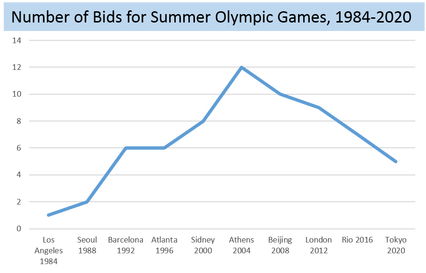While the vast majority of Circus Maximus details the downside of hosting these events, there are some small grounds for optimism. One of the grounds for optimism is the reduced number of bidders for the Olympics Games. The first sentence of Chapter 1 in Circus Maximus says "No city wanted to host the 1984 Olympic Games." Then Los Angeles stepped forward and made a deal. LA made a deal. LA leveraged the monopoly position it found itself in dealing with another monopoly. Zimbalist uses this example and the recent reduction in the number of bidders for the Olympics as one possible ground for optimism. The number of bidders for each summer Olympic Games since 1984 is presented in the graph below. The number of bidders climbs from the one city in 1984 to twelve for the 2004 games. It then declines to five cities for the 2020 games.
Another reason for optimism is the manner in which the less powerful are starting to organise to protect their interests. Within the Olympic movement there is a movement towards a more democratic share of the revenues. Zimbalist explains how the failure of various US bids to secure events was interpreted as a backlash against its share of the revenues. As a result, in 2012 the US agreed to take a lower share of some of the revenue streams (including broadcast revenue).
The citizens of potential bidders are also making their views known through protests and the ballot box. They are voting against hosting such events (at least in the more democratic countries). Organisers react to the opposition in different ways. In many cases, guns are employed to make the case for hosting the event. In less democratic regimes, inhabitants close to the sites are moved at gunpoint and protesters face the massed ranks of armed security forces. In more democratic regimes, the hired guns are consultants and their chosen weapon is the impact study.
(Circus Maximus is reviewed in the Book Review page on this blog.)

 RSS Feed
RSS Feed